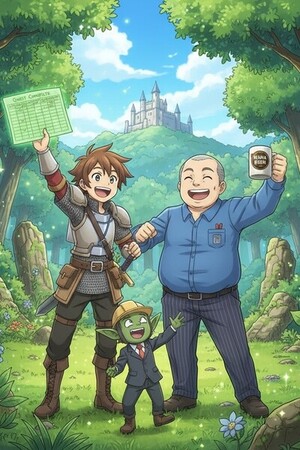Chapter 30:
High Honors
Earthly Solutions
The ceremony recognizing our contributions to kingdom-wide economic reform was scheduled for a Thursday morning at the Royal Palace, and it was conducted with the kind of elaborate formality that made our original corporate awards dinners look like casual coffee meetings.
"Mr. Kenji Tanaka," announced the [Human Royal Chamberlain, Level 16] as we stood in what appeared to be the most ornate throne room I'd ever seen, "His Majesty recognizes your exceptional contributions to systematic financial management, institutional reform, and the prevention of administrative corruption throughout the kingdom."
I watched Mr. Tanaka receive what was probably the most elaborate medal I'd ever seen, an enormous golden disk decorated with intricate engravings and suspended from a ribbon that looked like it cost more than most people's annual income. The thing was easily six inches in diameter and heavy enough to serve as a weapon if necessary.
"For your services to the economic welfare of the realm," the [Human King, Level 25] declared formally, "we bestow upon you the Order of the Royal Treasury, the highest honor available for contributions to fiscal excellence and administrative integrity."
The applause from the assembled court officials was appropriately dignified, but I could see Mr. Tanaka's expression shifting from professional satisfaction to what looked suspiciously like analytical concern.
"Your Majesty," Mr. Tanaka said after the ceremony concluded and we were invited to a private audience, "I need to discuss the documentation requirements for this recognition."
The King blinked. "Documentation requirements?"
"Yes, sir. Specifically, I need to understand the exact monetary value of this award for tax reporting purposes, the depreciation schedule that should be applied to ceremonial recognition items, and what compliance obligations might be associated with royal honors."
I watched the King's expression shift from regal authority to genuine confusion. "Mr. Tanaka, it's a medal. A symbol of royal appreciation."
"I understand that it's ceremonial, Your Majesty, but I need to ensure proper accounting treatment. Is this considered taxable income? Does it create any conflicts of interest with our consulting relationships? Are there ongoing obligations associated with royal recognition that might affect our business operations?"
The [Human Royal Treasurer, Level 12] who was observing this exchange looked like he was witnessing something unprecedented in the history of royal ceremonies.
"Sir," the treasurer interjected carefully, "most recipients simply... accept the honor and express gratitude."
"Most recipients probably don't operate professional consulting firms that require comprehensive documentation of all income sources and potential conflicts of interest," Mr. Tanaka replied reasonably. "I need to ensure that accepting this recognition doesn't create compliance issues or suggest preferential treatment in future business relationships."
The King was now staring at Mr. Tanaka with the expression of someone who had never encountered this particular type of response to royal honors.
"Mr. Tanaka," His Majesty said slowly, "are you requesting a formal audit of the award process?"
"I'm requesting sufficient documentation to ensure proper reporting and compliance with professional standards," Mr. Tanaka confirmed. "Additionally, I'd like to review the specific criteria used to determine eligibility for this recognition to verify that it accurately reflects our documented achievements."
"The criteria were... your exceptional contributions to economic reform?"
"That's too general for proper documentation," Mr. Tanaka said, pulling out his notebook. "I need quantifiable metrics, performance standards, and comparison data that justify the recognition level relative to other potential recipients."
I decided to intervene before Mr. Tanaka could conduct a comprehensive analysis of royal award methodology.
"Your Majesty," I said diplomatically, "my partner is extremely committed to proper documentation and compliance procedures. Perhaps the Royal Treasury Office could provide him with the technical details he needs while we express our gratitude for this recognition?"
"That would be excellent," the King said with obvious relief. "And please understand that this honor reflects genuine appreciation for work that has benefited the entire kingdom."
"We're honored by your recognition, Your Majesty," I replied. "And we're committed to continuing our efforts to improve systematic financial management throughout the realm."
After the ceremony, as we made our way back to our offices, I noticed that Mr. Tanaka was examining his medal with the same analytical attention he applied to complex financial documents.
"Mr. Tanaka," I said, "you do realize that most people would just be proud of receiving the kingdom's highest honor for fiscal excellence?"
"I am proud," he replied, carefully examining the medal's construction and materials. "But I'm also responsible for ensuring that our business operations maintain the highest standards of professional integrity. Accepting recognition without proper documentation could create complications later."
"What kind of complications?"
"What if competitors challenge our consulting credentials based on alleged preferential treatment from royal authorities? What if clients question our objectivity because we've received official recognition? What if regulatory agencies interpret this award as evidence of political favoritism rather than professional competence?"
I had to admit; his concerns weren't entirely unreasonable.
"Plus," he continued, "I need to understand the exact specifications of this medal for insurance and security purposes. It appears to be made of actual gold, which means it has significant monetary value that requires proper coverage and protection."
"You're going to insure the medal?"
"I'm going to ensure that all valuable assets are properly documented and protected," he corrected. "This medal represents both professional recognition and financial liability, which means it requires systematic management like any other business asset."
As we reached our office, Selena was waiting with what appeared to be her own royal recognition, a formal proclamation designating her as "Master Craftsman of the Royal Equipment Standards Board."
"Congratulations," I said, noting that her recognition came with detailed technical specifications rather than ceremonial jewelry.
"Thank you. And apparently, this appointment comes with administrative authority to establish manufacturing standards across all craft guilds in the kingdom." She showed us documentation that outlined her new responsibilities. "It's essentially a technical oversight position with the power to implement systematic quality control procedures."
"Any documentation concerns?" Mr. Tanaka asked immediately.
"Actually, they provided comprehensive job descriptions, performance metrics, compensation schedules, and detailed reporting requirements," Selena replied. "Very professional presentation."
"Finally," Mr. Tanaka said with satisfaction, "official recognition that includes proper administrative documentation."
Over the following days, it became clear that our royal honors were more than just ceremonial recognition—they represented official acknowledgment that our methods had become the standard for financial and administrative excellence throughout the kingdom.
"Mr. Tanaka," said the [Human Royal Administrative Coordinator, Level 13] during one of our implementation meetings, "your systematic approach to institutional reform has been designated as the official methodology for all future administrative modernization projects."
"What does that mean practically?" I asked.
"It means that any guild, municipal office, or commercial organization that wants to implement systematic improvements will be required to use methods consistent with Earthly Solutions LLC's established procedures."
Mr. Tanaka was making rapid notes. "Are there specific compliance requirements for organizations that adopt our methodologies?"
"Yes, sir. Documentation standards, transparency protocols, and performance metrics that ensure consistent implementation of systematic optimization principles."
I realized that our interdimensional business adventure had accomplished something remarkable: not only had we built a successful consulting firm and defeated institutional corruption, but our methods had become the official standard for professional excellence throughout an entire kingdom.
"Yamamoto," Mr. Tanaka said quietly as we reviewed the documentation for our new official status, "do you understand what this means?"
"That we've accidentally become the most influential financial consultants in the realm?"
"That we've proven systematic competence and transparent business practices aren't just personally satisfying—they're scalable solutions that can transform entire institutional frameworks when applied with sufficient precision and commitment."
"And the royal recognition?"
"The royal recognition is documentation that meaningful work, properly executed, creates value that extends far beyond immediate business success," he said with the satisfied precision of someone who had found genuine professional fulfillment.
As we prepared for our expanded responsibilities as official advisors to the kingdom's administrative modernization efforts, I reflected on how dramatically our situation had changed since our arrival in this world.
We'd gone from miserable corporate employees to successful entrepreneurs to institutional reformers to officially recognized experts whose methods were now the standard for professional excellence throughout the realm.




Please sign in to leave a comment.